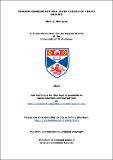Random generation and chief length of finite groups
Abstract
Part I of this thesis studies P[subscript(G)](d), the probability of generating a nonabelian
simple group G with d randomly chosen elements, and extends this
idea to consider the conditional probability P[subscript(G,Soc(G))](d), the probability
of generating an almost simple group G by d randomly chosen elements,
given that they project onto a generating set of G/Soc(G). In particular
we show that for a 2-generated almost simple group, P[subscript(G,Soc(G))](2) 53≥90,
with equality if and only if G = A₆ or S₆. Furthermore P[subscript(G,Soc(G))](2) 9≥10
except for 30 almost simple groups G, and we specify this list and provide
exact values for P[subscript(G,Soc(G))](2) in these cases. We conclude Part I by showing
that for all almost simple groups P[subscript(G,Soc(G))](3)≥139/150.
In Part II we consider a related notion. Given a probability ε, we wish
to determine d[superscript(ε)] (G), the number of random elements needed to generate a finite group G with failure probabilty at most ε. A generalisation of a result
of Lubotzky bounds d[superscript(ε)](G) in terms of l(G), the chief length of G, and d(G),
the minimal number of generators needed to generate G. We obtain bounds
on the chief length of permutation groups in terms of the degree n, and
bounds on the chief length of completely reducible matrix groups in terms
of the dimension and field size. Combining these with existing bounds on
d(G), we obtain bounds on d[superscript(ε)] (G) for permutation groups and completely
reducible matrix groups.
Type
Thesis, PhD Doctor of Philosophy
Rights
Creative Commons Attribution-NonCommercial-NoDerivs 3.0 Unported
http://creativecommons.org/licenses/by-nc-nd/3.0/
Collections
Except where otherwise noted within the work, this item's licence for re-use is described as Creative Commons Attribution-NonCommercial-NoDerivs 3.0 Unported
Items in the St Andrews Research Repository are protected by copyright, with all rights reserved, unless otherwise indicated.
Related items
Showing items related by title, author, creator and subject.
-
Topics in computational group theory : primitive permutation groups and matrix group normalisers
Coutts, Hannah Jane (University of St Andrews, 2011-11) - ThesisPart I of this thesis presents methods for finding the primitive permutation groups of degree d, where 2500 ≤ d < 4096, using the O'Nan-Scott Theorem and Aschbacher's theorem. Tables of the groups G are given for each ... -
What is a group? Young children's perceptions of different types of groups and group entitativity
Plötner, Maria; Over, Harriet; Carpenter, Malinda; Tomasello, Michael (2016-03-24) - Journal articleTo date, developmental research on groups has focused mainly on in-group biases and intergroup relations. However, little is known about children’s general understanding of social groups and their perceptions of different ... -
The construction of finite soluble factor groups of finitely presented groups and its application
Wegner, Alexander (University of St Andrews, 1992) - ThesisComputational group theory deals with the design, analysis and computer implementation of algorithms for solving computational problems involving groups, and with the applications of the programs produced to interesting ...


